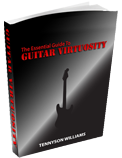Believe it or not but there is a whole world beyond the conventional scales and modes that western musicians are generally accustomed to. By western musician I don't mean a guy toting a rhinestone jacket, singing Two cigarettes in the ashtray by Patsy Cline or Willie Nelson. I can't remember who wrote it.
There are a ton of modes that have been classified as exotic, but keep in mind that they are only exotic to western musicians, or even better, to those who don't make the effort to wrap their minds around them.
I'll show you the first one that I know of, which can bring an amazing presence to your style on the guitar. We'll take a look at a Japanese scale and there are two versions and they both have a specific name, yet the names of both scales have slipped my mind, because I'm reaching way back into my knowledge. Most great guitarists don't even know any of these scales, and to be honest with you, I don't know the construction of these scales, so I can't share with you the whole tone/half tone formula or even the numbers formula. I will keep my eyes and ears open for all of the information that this post is lacking, and update it accordingly, but I can at least show you this scale and in a later post, share with you the other variation.
I may be wrong about this, but I have always looked at both forms of these scales and their relationship with one another, as the relationship between the major and minor pentatonic scales.
A lot of people are highly impressed with Marty Friedman of MegaDeth and Cacophany fame and a lot of guitarists would
consider Friedman to be a personal favorite. In my opinion, his creative phrasing well surpasses his technique and this can be attributed to his expansive knowledge of exotic scales.
I was on youtube recently and saw one of his videos. It was an improvisation and he was finding nice ways to install the Japanese scales. In fact, if you listen to a lot of his playing, he uses the Japanese scales quite frequently. Even on the song Symphony of Destruction. To clarify my point, the Japanese scales are absolutely wicked sounding, even alone and most exotic scales have this effect on the listener.
There are two videos in this addition to GuitArticles. The first is me playing the first variation of the Japanese scale and the second is that video with Marty Friedman. That way you can hear the scale alone, as it is, and also hear it used in the context of music.
Click To Enlarge
Jul 1, 2008
Japanese Scale No. 1
Labels:
scales and modes
Subscribe to:
Post Comments (Atom)


